Extension Foundation Online Campus
Search results: 548
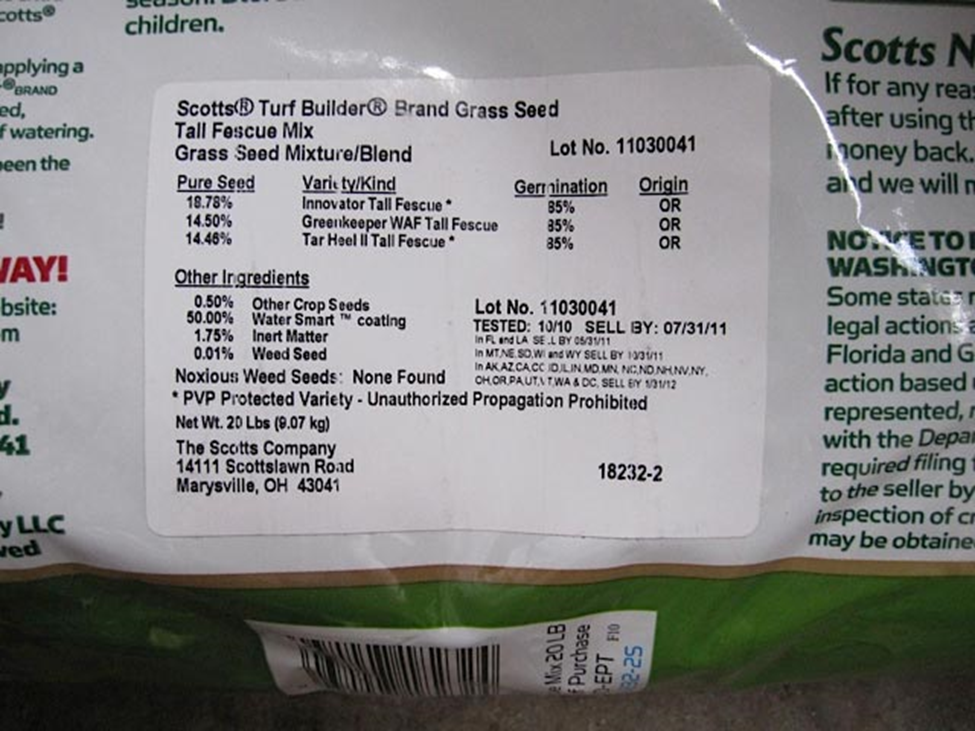
Summary: The Seed industry exists to provide high quality seed to farmers and growers. The value of seed is a measure of its ability to establish the desired field stand at low planting rates, grow into plants which are high-yielding, healthy, and the established type. The livelihood of farmers and the ultimate health of communities relies on the ability of seed to perform and grow into a crop that can be harvested and eaten. A system of laws and regulations has developed over time to protect societies and food systems from liability and risk. A seed conditioner must understand the system of laws and regulations in place, ensure that the conditioning plant and its operation are maintaining seed varietal identity through the entire process and avoid introduction of contaminants. This course is fifth in a series which will walk you through foundational concepts of seed conditioning.
Upskill Credentials: If you finish the entire course including passing the quiz with a score of 80% or better (which you can take up to 3 times) and filling out the short 5 mins feedback survey, then you will earn a badge certificate of completion. This course has been approved for 2 Crop Management CEUs through the national Certified Crop Adviser program.
Acknowledgements: This online micro-credential upskilling course is offered through the CSU Ag Upskilling program. This material is based upon work that is supported by the National Institute of Food and Agriculture, U.S. Department of Agriculture, under award number 2024-68018-42796, administered by Colorado State University. USDA is an equal opportunity employer and service provider. Any opinions, findings, conclusions, or recommendations expressed in this publication are those of the author(s) and do not necessarily reflect the view of the U.S. Department of Agriculture.

The enrollment fee for this course is $50.
You may also choose to purchase all 7 of the CSU Upskilling Seed Conditioning Courses for a discounted price of $300. To do so, click the link below.
- Teacher: Tamla Blunt
- Teacher: Deana Namuth-Covert
- Teacher: Rick Novak
- Teacher: Laura Pottorff
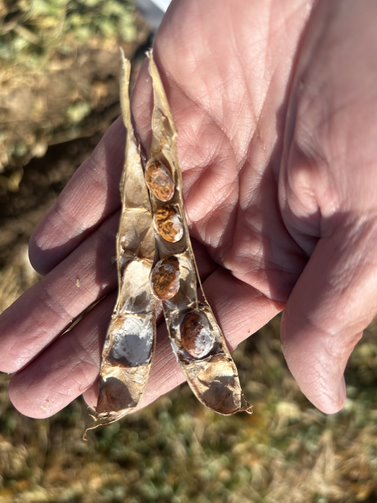
This course section is specifically for Pesticide Applicators working on CEUs with the Colorado Department of Agriculture's Licensing Program
Summary: Seed can serve as a pathway for introducing plant diseases and other pests to new environments and new countries. The risk to agriculture is very high should a new pathogen become introduced and established in an important crop. Seed of over 300 species of plants are moved globally, often several times before being sold commercially. Therefore, the removal or management of seed borne disease is imperative to protect global agriculture and trade. This course is seventh in a series which will walk you through foundational concepts of seed conditioning.
Upskill Credentials: If you finish the entire course including passing the quiz with a score of 80% or better (which you can take up to 3 times) and filling out the short 5 mins feedback survey, then you will earn a badge certificate of completion. This course has been approved for 2 Integrated Pest Management CEUs through the national Certified Crop Adviser program and 1 credit Continuing Education Credit with the Colorado Department of Agriculture for licensed Colorado qualified supervisors, certified operators, and private applicators.
Time Required: We estimate it will take you 1-2 hours in total to complete the course. You can work on it at your own pace and do not have to complete it in one setting.
ADA Accessibility: We have done our best to follow ADA best practices. Let us know if you run into any problems or require further accommodations.
If you have any questions, please contact your instructor, Laura Pottorff, M.S., Director of Seed Program at: Laura.Pottorff@colostate.edu
Acknowledgements: This online micro-credential upskilling course is offered through the CSU Ag Upskilling program. This material is based upon work that is supported by the National Institute of Food and Agriculture, U.S. Department of Agriculture, under award number 2024-68018-42796, administered by Colorado State University. USDA is an equal opportunity employer and service provider. Any opinions, findings, conclusions, or recommendations expressed in this publication are those of the author(s) and do not necessarily reflect the view of the U.S. Department of Agriculture.

The enrollment fee for this course is $50.
You may also choose to purchase all 7 of the CSU Upskilling Seed Conditioning Courses for a discounted price of $300, please contact Deana Namuth-Covert at Deana.namuth-covert@colostate.edu.
- Teacher: Tamla Blunt
- Teacher: Deana Namuth-Covert
- Teacher: Rick Novak

Summary: Seed can serve as a pathway for introducing plant diseases and other pests to new environments and new countries. The risk to agriculture is very high should a new pathogen become introduced and established in an important crop. Seed of over 300 species of plants are moved globally, often several times before being sold commercially. Therefore, the removal or management of seed borne disease is imperative to protect global agriculture and trade. This course is seventh in a series which will walk you through foundational concepts of seed conditioning.
Upskill Credentials: If you finish the entire course including passing the quiz with a score of 80% or better (which you can take up to 3 times) and filling out the short 5 mins feedback survey, then you will earn a badge certificate of completion. This course has been approved for 2 Integrated Pest Management CEUs through the national Certified Crop Adviser program.
Time Required: We estimate it will take you 1-2 hours in total to complete the course. You can work on it at your own pace and do not have to complete it in one setting. Click on the eBook link below to begin.
ADA Accessibility: We have done our best to follow ADA best practices. Let us know if you run into any problems or require further accommodations.
If you have any questions, please contact your instructor, Laura Pottorff, M.S., Director of Seed Program at: Laura.Pottorff@colostate.edu
Acknowledgements: This online micro-credential upskilling course is offered through the CSU Ag Upskilling program. This material is based upon work that is supported by the National Institute of Food and Agriculture, U.S. Department of Agriculture, under award number 2024-68018-42796, administered by Colorado State University. USDA is an equal opportunity employer and service provider. Any opinions, findings, conclusions, or recommendations expressed in this publication are those of the author(s) and do not necessarily reflect the view of the U.S. Department of Agriculture.

The enrollment fee for this course is $50.
You may also choose to purchase all 7 of the CSU Upskilling Seed Conditioning Courses for a discounted price of $300. To do so, click the link below.
- Teacher: Tamla Blunt
- Teacher: Deana Namuth-Covert
- Teacher: Rick Novak
- Teacher: Laura Pottorff
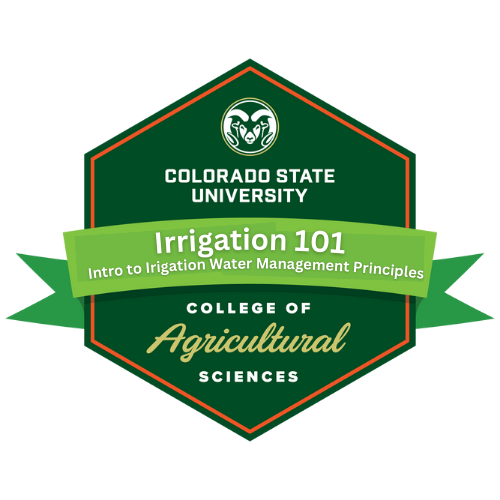
Summary: Irrigation is defined as the watering of land (or other plant growth media) by artificial means to foster plant growth. This can be very costly and the availability of supplemental water may be scarce, so it is important to be able to calculate accurately how much water to apply and when. This lesson will introduce you the underlying concepts you will need to consider.
After completing this lesson, you will be able to:
- Explain how the systems approach can be used to manage water in irrigated systems.
- Identify the fluxes (flows) of water and energy in an irrigated soil-plant-atmosphere system.
- Describe how the Irrigator’s Equation can be used to quantify the four (4) major variables involved in managing irrigation systems.
- Use the principle of conservation of mass to determine the water budget (also called water balance) of a soil-plant-atmosphere (SPA) system.
- Use the principle of conservation of energy to determine the energy budget (also called energy balance) of a SPA system.
Time Required: We estimate it will take you 2 hours in total to complete the lesson. You can work on it at your own pace and do not have to complete it in one setting.
Who Would Benefit: A variety of people will find this upskilling course useful from adults to high school students. This includes careers (or hobbyists) growing plants (ie field crops, greenhouse production, turf and lawns, gardens, etc.) and wishing to save money and water by better timing irrigation applications.
Upskill Credentials: If you finish the entire course including passing a final quiz (which you can take up to 3 times), then you will earn a badge certificate of completion. This has also been approved for 2 Soil and Water Management CEUs through the national Certified Crop Adviser program.
Instructor: Dr. Allan A. Andales is a Professor and Extension Specialist of Irrigation and Water Science in the Department of Soil and Crop Sciences, Colorado State University (CSU). He has a joint appointment in the Department of Civil and Environmental Engineering. Dr. Andales applies principles of soil and water engineering, environmental biophysics, and numerical methods to study the effects of management practices and environmental factors on field hydrology and agricultural production. Experimental data are used to develop computer models and decision support tools that can improve agricultural water use efficiency and water quality. He is a member of the CSU Extension Water Resource Management Team that engages the public in addressing agricultural and urban water issues in Colorado.
ADA Accessibility: We have done our best to follow ADA best practices. Let us know if you run into any problems or require further accommodations.
Acknowledgements: This online micro-credential upskilling course is offered through the CSU Ag Upskilling program. Development was supported in part by funding from the CHS Foundation, administered by Colorado State University (2022). The CHS Foundation, funded by charitable gifts from CHS Inc., is focused on developing a new generation of agriculture leaders for life-long success. Together, with our partners, we are igniting innovation and driving excellence in agriculture education, cultivating high impact programs for rural youth and accelerating potential for careers in agriculture. Learn more at CHS Foundation.


- Teacher: Allan Andales
- Teacher: Tamla Blunt
- Teacher: Deana Namuth-Covert
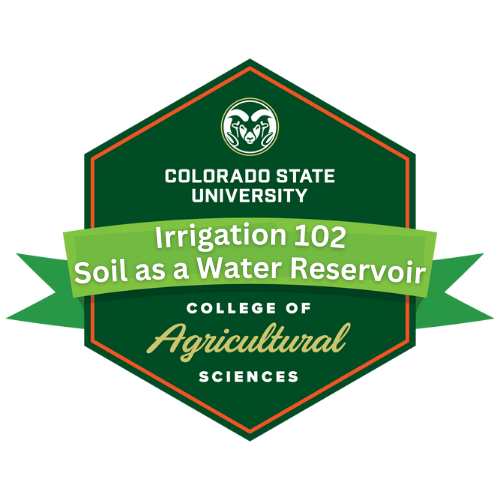
Summary: The goal of irrigation is to add water to the soil where the plant roots are actively growing (the root zone). The soil serves as a water reservoir, from which plants can withdraw water needed for growth. In irrigation management, it is necessary to know the characteristics of the soil in the area that you will be irrigating. These soil characteristics can be used to determine the amount of water in the root zone that is available to the plants.
After completing this lesson, you will be able to:
- Describe the concept of depth of water.
- Determine the depth of water that is available to the plants.
- Use the concept of depth of water to estimate the net irrigation requirement (i.e., soil water deficit) of the soil root zone.
Time Required: We estimate it will take you 2 hours in total to complete the lesson. You can work on it at your own pace and do not have to complete it in one setting.
Who Would Benefit: A variety of people will find this upskilling course useful from adults to high school students. This includes careers (or hobbyists) growing plants (ie field crops, greenhouse production, turf and lawns, gardens, etc.) and wishing to save money and water by better timing irrigation applications.
Upskill Credentials: If you finish the entire course including passing a final quiz (which you can take up to 3 times), then you will earn a badge certificate of completion. It has been approved for 2 Soil and Water Management CEUs through the national Certified Crop Adviser program.
Instructor: Dr. Allan A. Andales is a Professor and Extension Specialist of Irrigation and Water Science in the Department of Soil and Crop Sciences, Colorado State University (CSU). He has a joint appointment in the Department of Civil and Environmental Engineering. Dr. Andales applies principles of soil and water engineering, environmental biophysics, and numerical methods to study the effects of management practices and environmental factors on field hydrology and agricultural production. Experimental data are used to develop computer models and decision support tools that can improve agricultural water use efficiency and water quality. He is a member of the CSU Extension Water Resource Management Team that engages the public in addressing agricultural and urban water issues in Colorado.
ADA Accessibility: We have done our best to follow ADA best practices. Let us know if you run into any problems or require further accommodations.
Acknowledgements: This online micro-credential upskilling course is offered through the CSU Ag Upskilling program. Development was supported in part by funding from the CHS Foundation, administered by Colorado State University (2022). The CHS Foundation, funded by charitable gifts from CHS Inc., is focused on developing a new generation of agriculture leaders for life-long success. Together, with our partners, we are igniting innovation and driving excellence in agriculture education, cultivating high impact programs for rural youth and accelerating potential for careers in agriculture. Learn more at CHS Foundation.
- Teacher: Allan Andales
- Teacher: Deana Namuth-Covert
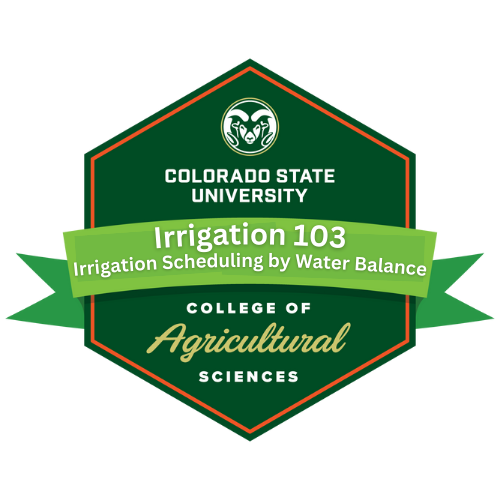
Summary: To effectively utilize limited irrigation resources in the most cost-effective manner requires balancing the inputs and outputs of water fluxes, as well as water that is stored in the soil profile. Best irrigation management scheduling practices focus on water balance in the rootzone because that is where the plant/crop is extracting water (and nutrients) from the soil. It is here we estimate the irrigation water requirements to maintain healthy plants. Decisions on when and how much irrigation water to apply depends on the soil water deficit and the management-allowed depletion (MAD). This lesson will walk you through each of these concepts including real world problem scenarios.
After completing this lesson, you will be able to:
- Use the water balance of the root zone to estimate the irrigation water requirement.
- Make irrigation decisions by comparing the soil water deficit to the management-allowed depletion.
Time Required: We estimate it will take you 2 hours in total to complete the lesson. You can work on it at your own pace and do not have to complete it in one setting.
Who Would Benefit: A variety of people will find this upskilling course useful from adults to high school students. This includes careers (or hobbyists) growing plants (ie field crops, greenhouse production, turf and lawns, gardens, etc.) and wishing to save money and water by better timing irrigation applications.
Upskill Credentials: If you finish the entire course including passing a final quiz (which you can take up to 3 times), then you will earn a badge certificate of completion. This has also been approved for 2 Soil and Water Management CEUs through the national Certified Crop Adviser program.
Instructor: Dr. Allan A. Andales is a Professor and Extension Specialist of Irrigation and Water Science in the Department of Soil and Crop Sciences, Colorado State University (CSU). He has a joint appointment in the Department of Civil and Environmental Engineering. Dr. Andales applies principles of soil and water engineering, environmental biophysics, and numerical methods to study the effects of management practices and environmental factors on field hydrology and agricultural production. Experimental data are used to develop computer models and decision support tools that can improve agricultural water use efficiency and water quality. He is a member of the CSU Extension Water Resource Management Team that engages the public in addressing agricultural and urban water issues in Colorado.
ADA Accessibility: We have done our best to follow ADA best practices. Let us know if you run into any problems or require further accommodations.
Acknowledgements: This online micro-credential upskilling course is offered through the CSU Ag Upskilling program. Development was supported in part by funding from the CHS Foundation, administered by Colorado State University (2022). The CHS Foundation, funded by charitable gifts from CHS Inc., is focused on developing a new generation of agriculture leaders for life-long success. Together, with our partners, we are igniting innovation and driving excellence in agriculture education, cultivating high impact programs for rural youth and accelerating potential for careers in agriculture. Learn more at CHS Foundation.
- Teacher: Allan Andales
- Teacher: Deana Namuth-Covert
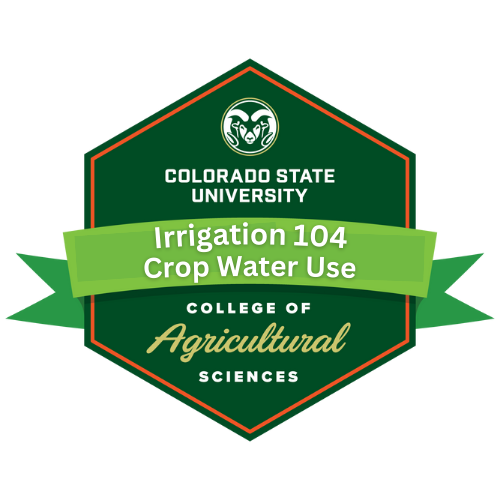
Summary: When making decisions about when to irrigate a crop, no matter the specific plant or scenario, it is important to take into consideration evapotranspiration rates which provide an estimate of water flux out of your system. The challenge is that evapotranspiration varies a lot depending on the specific plant, its growth stage plus changing weather (or greenhouse) conditions. Precision agriculture scientists have been able to characterize two reference crop values as a way to standardize evapotranspiration calculations based on weather data. In this lesson you will learn what is meant by a reference crop, crop coefficient, and water stress coefficient and how you can use these to inform your irrigation management decisions.
Time Required: We estimate it will take you 2 hours to complete the lesson. You can work on it at your own pace and do not have to complete it in one setting.
Who Would Benefit: A variety of people will find this upskilling course useful from adults to high school students. This includes careers (or hobbyists) growing plants (ie field crops, greenhouse production, turf and lawns, gardens, etc.) and wishing to save money and water by better timing irrigation applications.
Upskill Credentials: If you finish the entire course including passing a final quiz (which you can take up to 3 times), then you will earn a badge certificate of completion. It has been approved for 2 Soil and Water Management CEUs through the national Certified Crop Adviser program.
Instructor: Dr. Allan A. Andales is a Professor and Extension Specialist of Irrigation and Water Science in the Department of Soil and Crop Sciences, Colorado State University (CSU). He has a joint appointment in the Department of Civil and Environmental Engineering. Dr. Andales applies principles of soil and water engineering, environmental biophysics, and numerical methods to study the effects of management practices and environmental factors on field hydrology and agricultural production. Experimental data are used to develop computer models and decision support tools that can improve agricultural water use efficiency and water quality. He is a member of the CSU Extension Water Resource Management Team that engages the public in addressing agricultural and urban water issues in Colorado.
ADA Accessibility: We have done our best to follow ADA best practices. Let us know if you run into any problems or require further accommodations.
Acknowledgements: This online micro-credential upskilling course is offered through the CSU Ag Upskilling program. Development was supported in part by funding from the CHS Foundation, administered by Colorado State University (2022). The CHS Foundation, funded by charitable gifts from CHS Inc., is focused on developing a new generation of agriculture leaders for life-long success. Together, with our partners, we are igniting innovation and driving excellence in agriculture education, cultivating high impact programs for rural youth and accelerating potential for careers in agriculture. Learn more at CHS Foundation.


- Teacher: Allan Andales
- Teacher: Deana Namuth-Covert
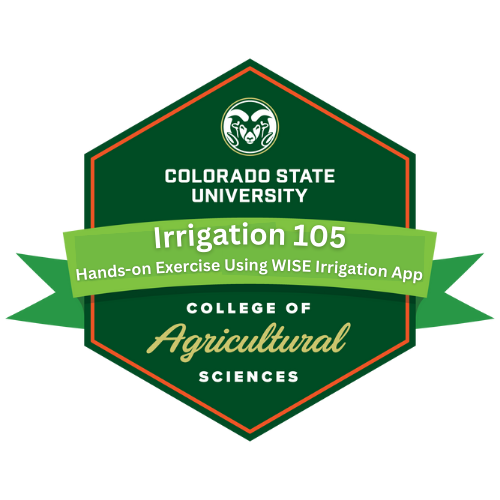
Summary: No matter the particular plant scenario you are working with (ie field crop, pastureland, Greenhouse business, turf grass, home garden and landscaping, etc.) being able to accurately estimate the water needs and timing of irrigation will help lower costs, as well as preserve limited water supplies. In this lesson you will learn how to use a specific irrigation app which has been developed by a group of public researchers and is free for your use. This app, along with the foundational irrigation principles you learned in previous lessons and/or from your previous knowledge will help you maximize the effects of your irrigation applications while minimizing costs. This lesson uses a Colorado field example.
After completing this lesson, you will be able to:
- Set up a field in the Water Irrigation Scheduler for Efficient Application (WISE) App to schedule irrigations during one growing season.
- Input irrigation amounts in WISE based on estimated soil water deficits (D) and the crop’s management allowed depletion (MAD) during one growing season.
- Interpret the WISE water balance outputs.
Time Required: We estimate it will take you 2 hours to complete the lesson. You can work on it at your own pace and do not have to complete it in one setting.
Who Would Benefit: A variety of people will find this upskilling course useful from adults to high school students. This includes careers (or hobbyists) growing plants (ie field crops, greenhouse production, turf and lawns, gardens, etc.) and wishing to save money and water by better timing irrigation applications.
Upskill Credentials: If you finish the entire course including passing a final quiz (which you can take up to 3 times), then you will earn a badge certificate of completion. It has been approved for 2 Crop Management CEUs through the national Certified Crop Adviser program.
Instructor: Dr. Allan A. Andales is a Professor and Extension Specialist of Irrigation and Water Science in the Department of Soil and Crop Sciences, Colorado State University (CSU). He has a joint appointment in the Department of Civil and Environmental Engineering. Dr. Andales applies principles of soil and water engineering, environmental biophysics, and numerical methods to study the effects of management practices and environmental factors on field hydrology and agricultural production. Experimental data are used to develop computer models and decision support tools that can improve agricultural water use efficiency and water quality. He is a member of the CSU Extension Water Resource Management Team that engages the public in addressing agricultural and urban water issues in Colorado.
ADA Accessibility: We have done our best to follow ADA best practices. Let us know if you run into any problems or require further accommodations.
Acknowledgements: This online micro-credential upskilling course is offered through the CSU Ag Upskilling program. Development was supported in part by funding from the CHS Foundation, administered by Colorado State University (2022). The CHS Foundation, funded by charitable gifts from CHS Inc., is focused on developing a new generation of agriculture leaders for life-long success. Together, with our partners, we are igniting innovation and driving excellence in agriculture education, cultivating high impact programs for rural youth and accelerating potential for careers in agriculture. Learn more at CHS Foundation.


- Teacher: Allan Andales
- Teacher: Deana Namuth-Covert
Learn how to train employees to safely use tools and personal protective equipment, and in ergonomic approaches to farm tasks that will support season-long productivity and prevent injuries and lost work time.
The workshop is part of the 2022 Farm Labor Dashboard Workshop Series, which focuses on helping farmers build practical labor management knowledge and skills.
Lead presenter: Aaron Yoder, University of Nebraska Medical Center.
Session Format: Sessions will be delivered via Zoom. Connection information, along with additional resources and information will be available through the workshop site.
Fees. The workshop fee is $20. To purchase and enroll in the course, click the following button:
Scholarships and multi-session discounts are available for all workshops in the series, reducing the workshop fee to $10. However, these options are only available for people who request – and receive approval – for reduced fees in advance of registration and payment. To request either a multi-session discount or scholarship, please fill out this online form. Please wait to register until you hear back from us via email . Decisions are generally made within 3 business days. If you are approved, you will receive a voucher code that you will use during the registration/payment process to activate a reduced registration fee for the workshops you indicated you wish to enroll in.- Instructor: Beth Holtzman
- Instructor: Aaron Yoder
Curso de Cuidado y Manejo del Caballo para Vaqueros y Procesadores - Versión en Español es ofrecido por la Corporación HorseQuest para el público en general, productores de ganado de engorda y empleados que aprenderán cómo manejar con seguridad los caballos (horses) cuando se trabaja en los corrales de alimentación (feedlot), así como también el cuidado y manejo básica del caballo.
Para obtener más información o para inscribirse contacte a Kathy Anderson, en la Universidad de Nebraska-Lincoln, a la dirección de correo electrónico: kanderson1@unl.edu
Para asistencia técnica por favor contacte campushelp@extension.org
Este curso requiere una cuota de inscripción de $25. Una vez pagada la cuota de inscripción, recibirá un correo electrónico con la clave de acceso.
Por favor, vaya a: Pen Rider and Processors Horse Safety and Care Certification Course (http://marketplace.unl.edu/extension/programs/feedlot-horse.html) para registrarse.
- Teacher: Kathy Anderson
- Teacher: Colleen Brady
Design Your Succession Plan workshops assists farm/ranch owners to get started on their succession plan and shape the future of their operation. This workbooks will help an owner get started on a succession plan; lean how to open lines of communication with family, employees, and partners to create a shared vision; and construct a plan to work with professionals who will assist in the transition process.
The fee for this workshop is $10. To purchase and enroll in the course, click the following link:
- Teacher: Sonja Fuchs

Design Your Succession Plan for Small Business workshops assists small business owners to get started on their succession plan and shape the future ownership of their business. This workbook will help a business owner get started on a succession plan; learn how to open lines of communication with family, employees, and partners to create a shared vision; and construct a plan to work with professionals who will assist in the transition process.
The fee for this course is $10. To purchase and enroll in the course, click the following button:
- Teacher: Sonja Fuchs
The Designed for Impact: Effective Extension Series enables educators to gain practical skills and knowledge to improve their teaching and increase learner engagement. This six-part series is designed for Extension professionals to create an outcome-based instructional design, a learner-centered teaching plan, and an end-of-event survey. After this series, participants can reuse the context-specific templates and guidance to develop future educational programs.
- Teacher: Mary Halbleib
The Designed for Impact: Effective Extension Education Series equips educators with practical skills and knowledge to improve their teaching and increase learner engagement. This six-part series is designed for Extension professionals to create an outcome-based instructional design, a learner-centered teaching plan, and an end-of-event survey. After this series, participants can reuse the context-specific templates and guidance to develop future educational programs.
- Teacher: Mary Halbleib
The Designed for Impact: Effective Extension Series enables educators to gain practical skills and knowledge to improve their teaching and increase learner engagement. This six-part series is designed for Extension professionals to create an outcome-based instructional design, a learner-centered teaching plan, and an end-of-event survey. After this series, participants can reuse the context-specific templates and guidance to develop future educational programs.
- Teacher: Mary Halbleib
The Designed for Impact: The Effective Extension Series enables educators to gain practical skills and knowledge to improve their teaching and increase learner engagement. This six-part series is designed for Extension professionals to create an outcome-based instructional design, a learner-centered teaching plan, and an end-of-event survey. After this series, participants can reuse the context-specific templates and guidance to develop future educational programs.
- Teacher: Mary Halbleib
Esta capacitación en línea sirve como recurso para ganaderos, veterinarios y otras partes interesadas de la industria lechera, apoyando la capacitación de los trabajadores agrícolas en el manejo racional de antimicrobianos, la identificación de enfermedades en vacas adultas y el cumplimiento de los protocolos de la granja.
Objetivos del curso
Los participantes podrán describir los procedimientos para la identificación precisa y las opciones de tratamiento para casos de mastitis, metritis y cojeras en vacas lecheras adultas.
Formato del curso
Este curso está disponible completamente en línea, sin clases programadas ni fechas límite fijas. Puede comenzar el curso en cualquier momento y completarlo de forma independiente a su propio ritmo.
Organización del curso
Esta capacitación sobre manejo racional de antimicrobianos en ganado lechero consta de seis módulos. Cada módulo puede completarse en cualquier orden; sin embargo, seguir el orden de presentación puede facilitar el aprendizaje y la discusión sobre temas específicos en la granja. Los módulos incluyen:
- Resistencia a los antibióticos
- Cojeras
- Mastitis
- Metritis
- Protocolo de tratamiento
- Exámenes visuales
Certificado de culminación
Un certificado de culminación está disponible como una opción. Este certificado estará disponible una vez complete los seis módulos.
Requisitos tecnológicos
• Para un rendimiento óptimo, se requiere una computadora o tableta compatible con las versiones más recientes de navegadores web y capaz de reproducir archivos mp4. Se recomienda usar una computadora con no más de cinco años de antigüedad, con al menos 1 GB de RAM y conexión a internet de alta velocidad. Algunas funciones pueden no ser compatibles con dispositivos móviles.
• Adobe Acrobat Reader. Se puede descargar aquí gratuitamente.
• Los navegadores web recomendados son Mozilla Firefox, Google Chrome y Microsoft Edge.
Contáctenos
Si tiene alguna pregunta sobre el curso, comuníquese con los instructores Greg Habing en habing.4@osu.edu o Richard V. Pereira en rvpereira@ucdavis.edu.
Este programa fue galardonado con el Reconocimiento 2025 a las buenas prácticas e innovaciones en transformación ganadera sostenible, Una Salud, salud animal y Centros de Referencia. 
Financiamiento proporcionado por la División de Uso y Administración de Antimicrobianos (AUS) del Departamento de Alimentos y Agricultura de California.


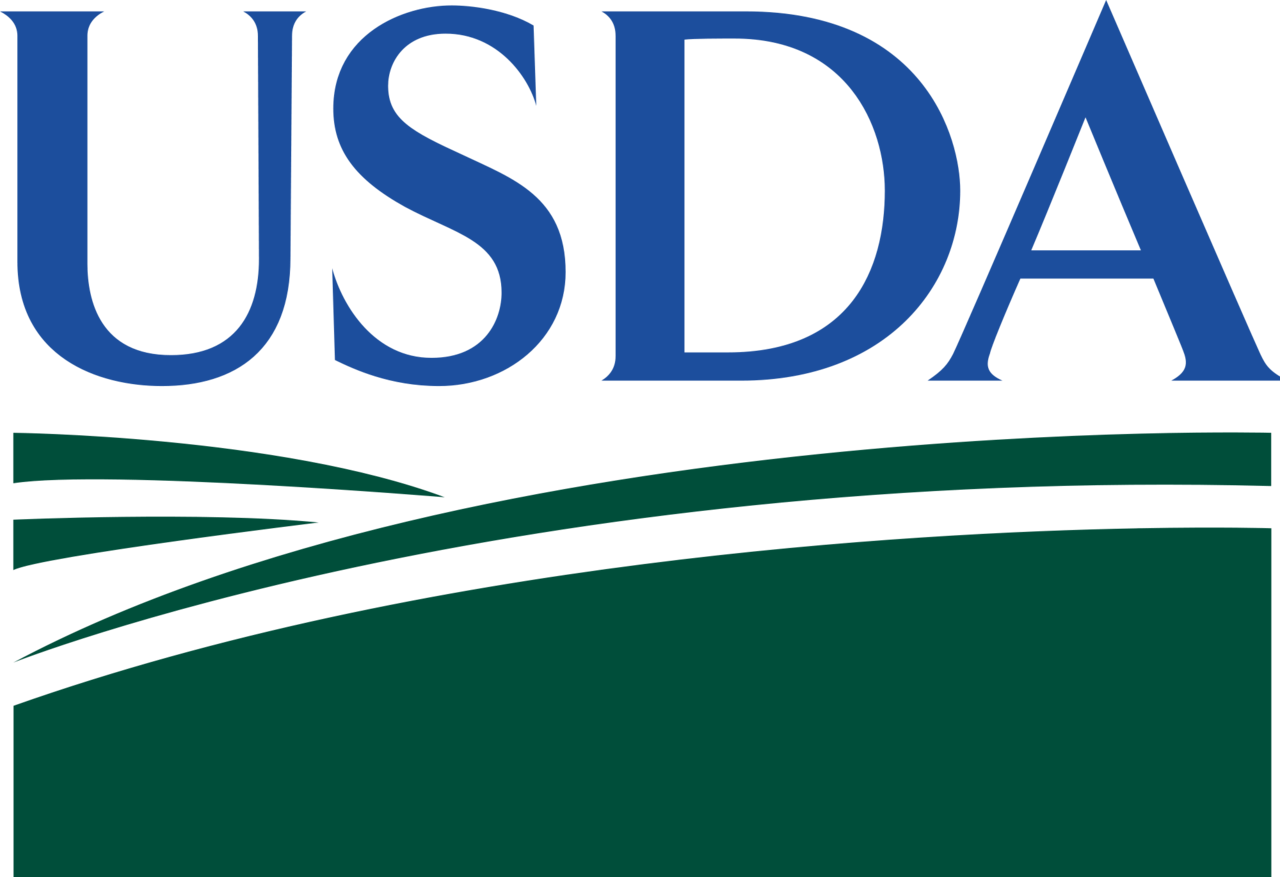
Presentado por:

- Teacher: Greg Habing
- Teacher: Richard Pereira
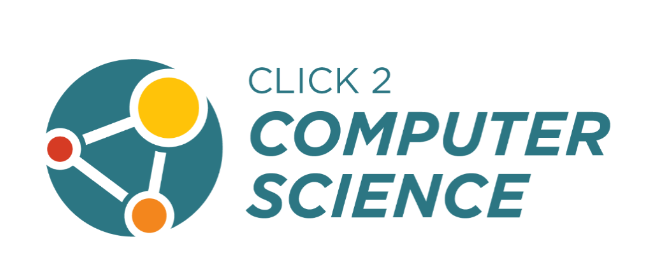
- Designer: Saundra Frerichs
- Designer: Ann O'Connor
- Designer: Angie Rushman
Thursday evening class sessions | Live via Zoom
February 18, 25 and March 4 & 11
5:30 - 7:30 pm PST / 6:30 - 8:30 pm MST
Wondering what to do to create a sustainable market garden in Idaho? If you’re interested in small-scale production of vegetables, fruits, culinary herbs, or cut flowers to sell, this course is for you! We will focus on in-depth production skills and taking what you grow to market. Join our group of Extension Educators and farmer collaborators for presentations and activities to guide you through the production year. From farm planning, to harvesting, washing and packing you will come away with skills needed to run a more sustainable and efficient farm.
- Teacher: Colette DePhelps
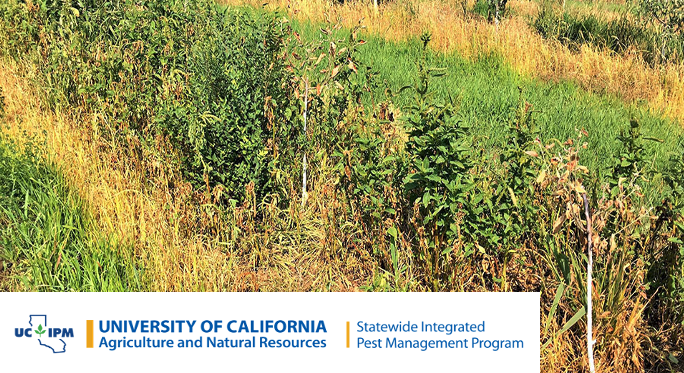

This course provides a rare opportunity for professionals to gain understanding of how an herbicide injury situation can arise and to efficiently update their background knowledge of herbicide characteristics in relation to different damage patterns. The goal of this course is to provide learners with a basic guide to approach diagnosing and investigating crop injury situations known or suspected to be related to herbicides, while giving them the tools to facilitate the investigation process. This course is available for free for those who do not need Continuing Education Units. The authors of the course are Dr. Brad Hanson, Professor of Cooperative Extension UC Davis and Dr. Kassim Al-Khatib, Professor of Plant Sciences, UC Davis.
Who should enroll?
Growers, pest control advisers, sales representatives for chemical companies, field investigators, and insurance adjusters
Continuing Education Units
California Department of Pesticide Regulation (1.5 hours Other) and Certified Crop Adviser (1.5 IPM).
To get the Continuing Education Units certificate you will be charged a fee of $30. To encourage taking the course earlier in the year, we offer 50% off the regular price from January through October 31st – use the code ipm50 at checkout. You must download the certificate (PDF file) to receive your CEU credits.
Enrollment period
This course must be completed by December 30 of the current year. Download the certificate immediately when you complete the course. You will not be able to retrieve your certificate after December 30.
- Technical support: UC IPM Online Training Support
This course is for those who need continuing education units (CEUs) and a certificate. Make the purchase and after the payment, you will be redirected
to the course. Upon course completion, you will be able to download the course certificate.
Course must be completed and certificate downloaded before December 30 of the current year.
To access the free version of this course without a certificate, click on the title below:
Diagnosing Herbicide Injury
- Technical support: UC IPM Online Training Support
This course is designed as a self-paced learning environment, delivered entirely online with video, lectures, reading and progression quizzing. Learning content is based on research publications and extension resources developed by national experts. The targeted learner is expected to have completed undergraduate level coursework in genetics. A final competency test will be given online.
The course has two parts. Part 1 provides the learner with a baseline in the biology of oomycete disease in soybean. Part 2 is focused on the resistance breeding process for both single gene and partial resistance using naturally occurring variation in the soybean germplasm. Learners will be able to compare the genetics that differentiates seed products and describe the work and genetics applications breeders accomplished in developing these new products.
Please contact Kathy Schindler (kschindler1@unl.edu, 402-472-1730) with questions about registering.
- Teacher: Diane Nolan
- Teacher: Leah Sandall
This is a course designed as a self-paced learning environment, delivered entirely online with video, lectures, reading and progression quizzing. Learning content is based on research publications and extension resources developed by national experts. The targeted learner is expected to have completed undergraduate level coursework in genetics. A final competency test will be given online.
This course is a companion course to Disease Resistance Breeding: Soybean Case Study
Please contact Kathy Schindler (kschindler1@unl.edu, 402-472-1730) with questions about registering.
- Teacher: Diane Nolan
- Teacher: Leah Sandall
The purpose of Documenting Children’s Learning is to learn how to document children’s learning through observation and to prepare for in-person training offered by Nebraska Extension. This course is developed using Flash content so your device must be able to play flash in order to access the course.
For more information contact Katie Krause, UNL Extension, katie.krause@unl.edu
- Teacher: Katie Krause
Delaware State University is offering our Mobile Meat Processing Lab (MMPL) Training and Certification course as a two-part series so that small farmers in Delaware can become qualified to lease the MMPL to process small-ruminants, small-flock poultry, and/or cultured fish. The intent of this course is to ensure that prospective MMPL users have all of the necessary background knowledge they will need to successfully complete their application for a grant of inspection from the USDA. Part one of the series is this self-paced, online course work, where farmers will be given an overview of the site requirements for using the MMPL, the steps in applying for a USDA grant of inspection, the MMPL capabilities, use, and proper sanitation.
Once the online course work is completed, farmers will sign up to participate in an in-person lab, which is typically held at the Delaware State University Hickory Hill Research Farm, where they will be trained on the MMPL function and operation, and gain hands-on experience in processing animals using the MMPL. Farmers must successfully complete both the online and in-person portions of the series before they can lease the MMPL for use on their own.
- Teacher: John Clendaniel
- Teacher: Zuri Hobson-Gladney
- Teacher: Kwame Matthews
- Teacher: Amit Singh
This online training serves as a resource for farmers, veterinarians, and other stakeholders in the dairy industry, supporting the training of farm workers on antimicrobial stewardship, disease identification in adult cows, and adherence to farm protocols.
Course Goals
Learners will be able to describe procedures for accurate identification and options for treatment for cases of mastitis, metritis, and lameness in adult dairy cows.
Course Format
This course is available fully online with no scheduled class sessions or fixed due dates. You can start the course at any time and work through it independently at your own pace.
Course Organization
This antimicrobial stewardship dairy training consists of six modules. Individual modules can be viewed in any order, however, following the order of presentation may facilitate learning and discussion on specific topics on the farm. Modules include:
- Antibiotic Resistance
- Lameness
- Mastitis
- Metritis
- Treatment Protocol
- Visual Exams
Certificate of Completion
A certification of completion is available as an option. The certificate will be provided upon completion of all six modules.
Technology Requirements
- For best performance, a computer or tablet that supports the most recent web browser versions and is capable of playing mp4 files. It is recommended to use a computer five years old or newer with at least 1GB of RAM and high-speed internet connection. Some features may not be compatible with mobile devices.
- Adobe Acrobat Reader. Can be downloaded here for free.
- The recommended web browsers are Mozilla Firefox, Google Chrome, and Microsoft Edge.
Contact Us
If you have questions about the course, please contact the instructors: Greg Habing at habing.4@osu.edu or Richard V. Pereira at rvpereira@ucdavis.edu.
This program was a recipient of the 2025 Recognition of good practices and innovations in sustainable livestock transformation, One Health, animal health, and Reference Centres.


Funding provided by the Antimicrobial Use and Stewardship (AUS) Branch of the California Department of Food and Agriculture.



Brought to you by:

- Teacher: Greg Habing
- Teacher: Richard Pereira
The primary target audience for this course is Extension educators. EDEN believes that producers, emergency responders, government officials, and other animal agriculture stakeholders can benefit from the course as well. The estimated time to complete the entire course is eight hours, but the course does not have to be completed in one session.
The Extension Disaster Education Network (EDEN) is a collaborative multi-state effort by Extension Services across the country to improve the delivery of services to citizens affected by disasters.
For more information contact Kris Hiney, Oklahoma State University, khiney@okstate.edu
- Teacher: Kris Hiney
The Effective Extension Program Design, Teaching, and Evaluation Series enables educators to gain practical skills and knowledge that will improve their teaching and increase learner engagement. This six-part series is specifically designed for Extension professionals to create an outcome-based instructional design, a learner-centered teaching plan, and an end-of-event survey. After this series participants will be able to reuse the context-specific templates and guidance to develop future educational programs.
- Teacher: Mary Halbleib
In this section on training, efforts will be made to explain and simplify the process of developing a relationship with the horse where communication is simple and straightforward for both the horse and rider.
For information contact Colleen Brady, bradyc@purdue.edu.
The fee for this course is $10. To purchase and enroll in the course, click the following button.
If you purchase at least $40 worth of courses from this category, you can receive a 20% discount by entering the voucher code of HorseQuest20.
- Teacher: Kathy Anderson
- Teacher: Colleen Brady
- Teacher: Kris Hiney
eLearn Urban Forestry is a self-led, online, distance learning program geared speciifcally toward beginning urban foresters and those allied professionals working in and around urban and urbanizing landscapes, including service foresters, natural resource planners, landscape architects, city officials and public works employees. The program is comprised of ten learning modules: The Benefits and Costs of the Urban Forest; Tree Growth and Development; Urban Soils; Site, Tree Selection and Planting; Arboriculture; Assessing and Managing Tree Risk; Tree Disorder Diagnosis and Management; Trees and Construction; Public Policy and Urban Forestry; and Urban Forest Management.
For more information or to enroll, contact Leslie Boby, Southern Regional Extension Forestry, University of Georgia at lboby@sref.info.
- Teacher: Leslie Boby
